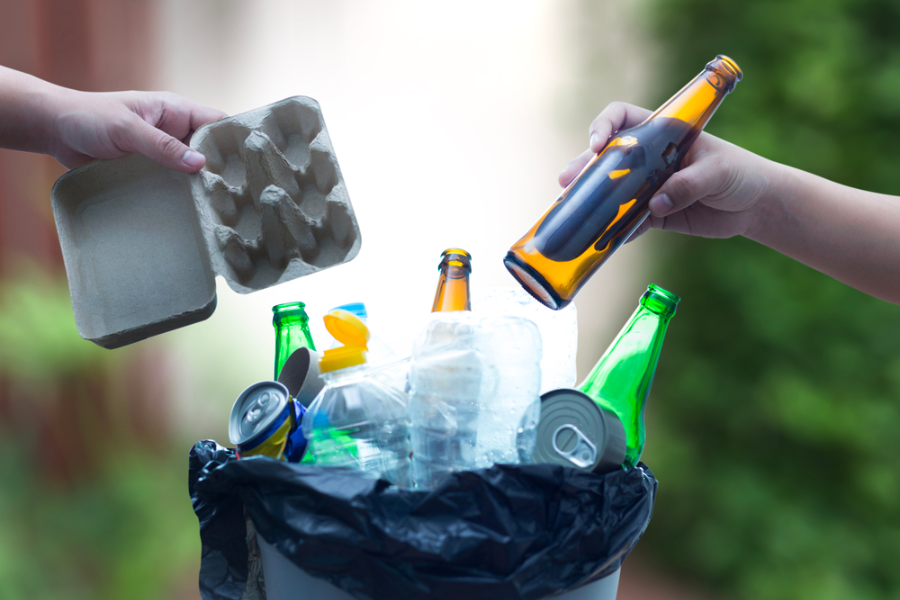
Michigan is on track to achieve its goal of 30% recycling rate by 2029. | OnePhoto/Shutterstock
The recycling rate in Michigan reached a record high of 23% in 2023, keeping the state on track to achieve its goal of a 30% recycling rate by 2029, according to a press release from the state’s Department of Environment, Great Lakes and Energy.
Kerrin O’Brien, executive director of the Michigan Recycling Coalition, credited the rising rates to collaborative efforts at the state and local levels, including financial investment.
“There’s no one single thing you can point to,” O’Brien told Resource Recycling. “Recycling developed in Michigan by communities stepping in to increase recycling and to pay for those services.”
Over the past five years, recycling programs received consistent state funding for the first time, she said. Although there was a bond issue in the late 1980s and early ’90s, it “dried up” without leadership, O’Brien said.
“With the commitment to funding recycling in an ongoing way, I think putting recycling into the hands of the state agency through the funding really stood as the flag in the sand saying we support recycling and we are going to go through with it,” she said.
The total residential volumes recycled in 2023 stood at 703,369 tons, higher by 82,000 tons or about 13% from the previous year, according to the press release. Nearly half was paper and paper products. Metals represented about one-third of the total, while glass and plastics represented the remainder.
In comparison, the 2019 rate was at 14.25%.
EGLE and The Recycling Partnership teamed up to introduce more than 245,000 curbside recycling carts in more than 30 Michigan communities, serving more than 1 million residents, according to the state agency. Michigan plans to introduce 88,000 more carts in 2024, among four communities.
In addition, 80% of state residents reported changing their recycling behavior for the better following EGLE’s 2019 launch of its “Know It Before You Throw It” recycling education campaign.
In 2008, the Michigan Recycling Coalition began a concerted effort to educate and to provide a vision about how the state’s recycling system could grow, identifying ongoing funding as the key, O’Brien said. Once then-Gov. Rick Snyder came on board with that vision, she said, he saw the opportunities and helped the organization spearhead an effort to move funding through the legislature.
“Parallel to that effort, he recognized that the state agency needed to facilitate industry leaders with a conversation around how Michigan’s solid waste laws could be more inclusive of productive materials management,” she added.
Looking ahead
In 2022, an update to the state’s solid waste law, known as Part 115 of the Natural Resources and Environmental Protection Act, became law.
Included in the package of bills was a mandate for counties to implement a materials management plan focusing on recyclable materials.
“Now that Part 115 has been updated, we will see all Michigan counties begin to plan for the first time in 25 years for materials management,” O’Brien said. “I think we’ll see more advancement, more conversation, more opportunities and more recognition that these services that need to be paid for will be paid for.
Michigan is at the start of its recycling journey, and needs much more investment for a full transition into a circular economy, she said.
“Recycling has been around for years and years, but it’s really been since 2018 that Michigan has invested in a meaningful and ongoing way, and we’re seeing progress with that investment,” O’Brien said. “If we’re going to put more use back into that material, it’s going to require more investment. Statewide leadership is important but all of this work really does happen at the community level.”
EGLE awards community grants
In related news, the state awarded more than $5 million in infrastructure grants to help support recycling projects. Those included:
- $900,000 to build Genesee County’s first recycling dropoff facility to collect paper, cardboard, plastic and electronics.
- $900,000 to Marquette County to expand capacity at its MRF, which currently processes about 8,500 tons a year. The project will add tipping floor space for inbound recyclables.
- $900,000 to Isabella County to expand and upgrade its MRF, which currently processes seven tons per hour.
- $527,000 to the city of Sterling Heights to support a transition from an optional subscription-based model to universal curbside recycling.
- $500,000 to Van Buren County to upgrade eight of 11 transfer station drop-off centers to increase capacity and efficiency and enable a partnership with the Van Buren Conservation District.
- $403,000 to the city of Madison Heights to introduce a community-wide recycling and trash cart program for its 9,600 households.
- $300,000 to the city of Lansing to fund purchases, including a recycling truck and Dumpster containers, and hire a marketing firm to enhance commercial and multifamily recycling.
- $140,000 to the Resource Recovery and Recycling Authority of Southwest Oakland County to help buy robotic sorting equipment to automate its Southfield MRF.
- $75,000 toward a collaboration between EGLE and the Michigan Grocers Association to boost recycling best practices at metro Detroit stores.
A version of this story appeared in Resource Recycling on July 1.